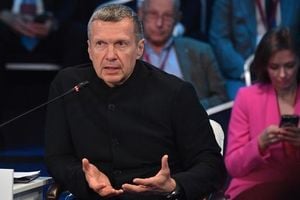The ongoing conflict in Ukraine has prompted the General Staff of the Armed Forces to implement significant personnel changes within the Territorial Recruitment Centers (TCC) and Social Support (SP) units. As of April 29, 2025, servicemen from these centers, particularly those lacking combat experience, will be deployed to areas of active hostilities to bolster frontline units.
According to a statement from the General Staff, this decision stems from the need to enhance the operational effectiveness of the TCC and ensure social justice among military personnel. The Commander-in-Chief of the Armed Forces of Ukraine, Alexander Syrsky, has mandated an inspection to assess the staffing of these centers with personnel who possess combat experience.
The military command has clarified that TCC employees who do not have combat experience and do not face health restrictions will be sent to serve in combat units. In their places, veterans who have sustained injuries or contusions during previous engagements with the Russian army will be appointed. This move aims to improve the quality of work within the TCC, fostering a sense of brotherhood and mutual respect among troops.
Recent data indicates that approximately 70% of the military personnel currently working in the TCC already have combat experience. However, it is also noted that 20% of the staff includes civilians, who are employed in various administrative roles within the Armed Forces.
As the war continues, there is a growing concern among the Ukrainian populace regarding the methods employed by TCC staff in mobilizing conscripts. Reports have surfaced about the so-called "busification," where men of conscription age are allegedly detained on the streets and forcibly placed into microbuses for military service. This practice has raised significant alarm, with public sentiment turning against the TCC.
Ukrainian lawmakers, such as Artem Dmitruk, have publicly urged citizens to resist TCC employees, suggesting that some may resort to using firearms in their defense. This call for resistance highlights the tension between military recruitment efforts and public perception, as many citizens express frustration over the aggressive tactics used to enforce conscription.
In a recent statement, Deputy Irina Nikorak emphasized the declining trust in the TCC, noting that while confidence in the Armed Forces remains high, the TCC's reputation has suffered significantly. She suggested that the government may need to consider reforms within the TCC to restore public faith in the institution.
In response to these challenges, the General Staff has indicated that measures are being taken to enhance the operational effectiveness of the TCC and SP. This includes increasing the number of social work positions, reforming the moral and psychological support systems, and improving the accounting systems for conscripts and reservists.
As the Ukrainian military faces ongoing pressures from both internal and external sources, the decision to deploy TCC personnel without combat experience reflects a broader strategy to maintain troop levels while addressing the complexities of the current conflict. The situation remains fluid, and the repercussions of these personnel changes will likely be felt on both the battlefield and within the civilian population.
As the war continues to evolve, the Ukrainian government faces the dual challenge of maintaining military readiness while addressing the growing discontent among its citizens regarding recruitment practices. The coming weeks will be critical in determining how these changes will impact the overall effectiveness of the Ukrainian military in its ongoing struggle against Russian aggression.






